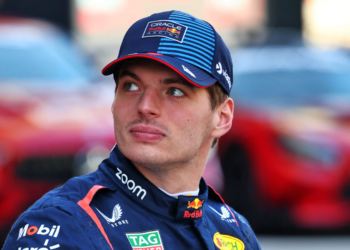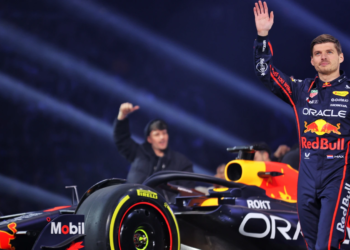Ferrari Chairman John Elkann has called for the FIA to implement “more clarity” on its application of rules in Formula 1 after Carlos Sainz’s grid drop in Las Vegas.
The inaugural race at the Las Vegas Strip Circuit was marred by Sainz sustaining extensive damage to his Ferrari car from a loose water valve cover that curtailed FP1.
Ferrari had to replace the chassis, gearbox and power unit, resulting in the Spaniard exceeding his yearly allocation on Energy Store components when a third was fitted.
Despite Ferrari lobbying for dispensation from the FIA stewards, the team’s request was turned down and Sainz was hit with a controversial 10-place grid penalty.
After Ferrari Team Principal Frederic Vasseur said he intended to hold discussions with the FIA, Elkann has become the next high-profile figure within the marque to openly suggest that more transparency is needed between the sport’s governing body and the teams.
Elkann believes that would prevent a repeat of the contentious conclusion to the 2021 championship in Abu Dhabi, which saw then-FIA race director Michael Masi removed.
“You don’t want things to happen like the 2021 championship, how that ended up,” Elkann said in an interview with the BBC. “You don’t want to have situations like the ones here in Vegas, where you get penalised 10 places.”

The Italian, 47, also notes improvements could be made to the openness of the FIA when it comes to discussing the outcome of each team’s compliance with the cost cap.
Since a regulatory cap limiting how much each outfit can spend each year was introduced back in 2021, only Red Bull has been found to have contravened the rules.
The Milton-Keynes-based squad was hit with a $7 million fine plus a 10% reduction in aerodynamic testing for 12 months – a penalty Vasseur described as “very low”.
Elkann added: “So from the regulatory standpoint in terms of rules and applications and what we have seen with the budget caps, those are areas where you’d like to have more clarity.”
Red Bull’s dominance of the latest ground effect era has witnessed it win all but one of the 21 races this year and the regulations will not encounter a radical overhaul until 2026.
But with revised aerodynamic rules and a new engine formula – featuring synthetic fuels – on the horizon, Elkann has stressed the importance of the FIA defining its limits.
“There are a lot of changes in how the evolution of technologies happen, the importance of being carbon-neutral,” he acknowledged. “Within that, being able to define clarity on rules and applications is important.”









